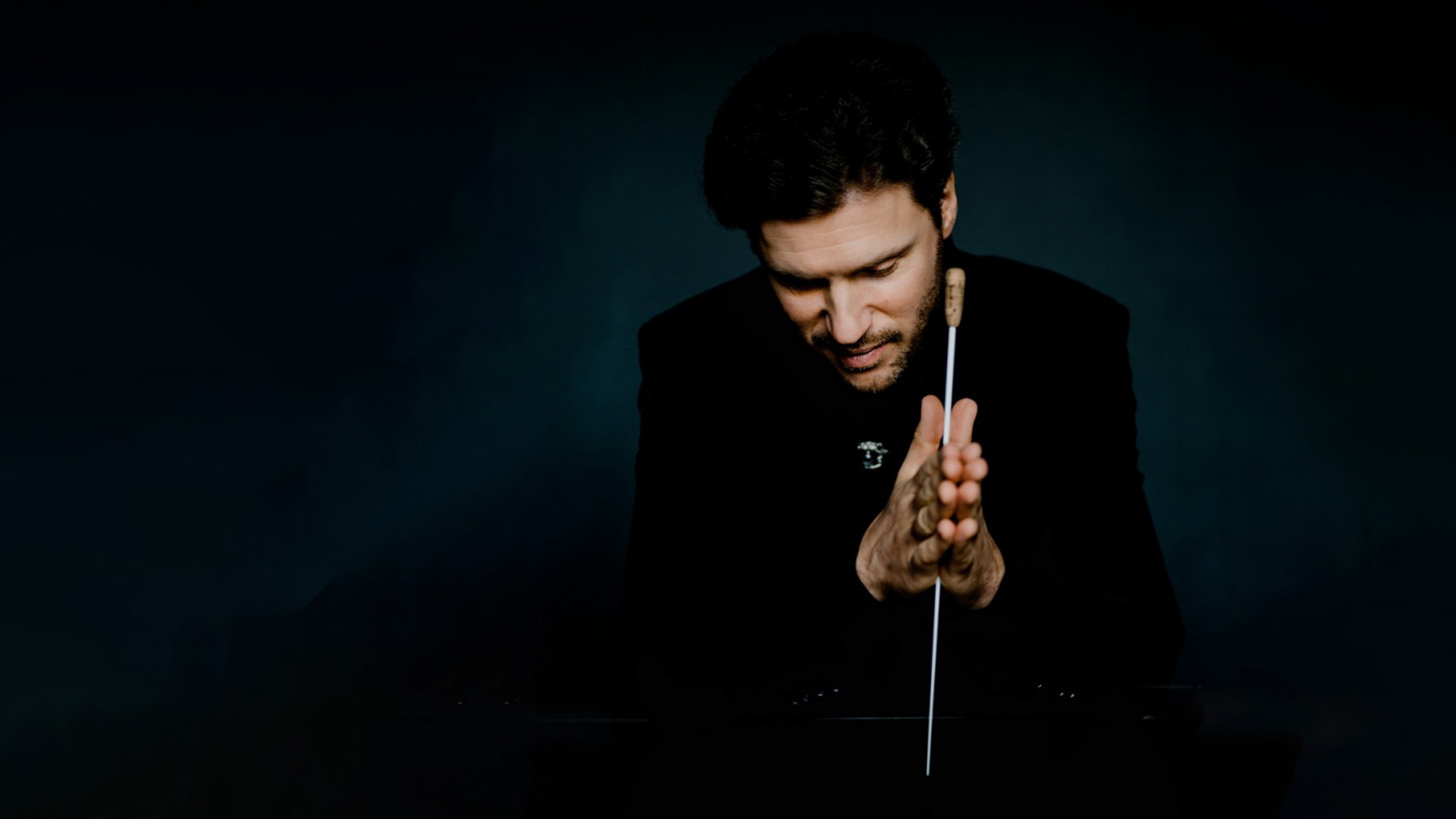Requiem de Verdi
Coro e Orquestra Gulbenkian
Event Slider
Date
- / Cancelled / Sold out
Location
Grand Auditorium Calouste Gulbenkian FoundationPricing
25% – Under 30
10% – Over 65
Cartão Gulbenkian:
50% – Under 30
15% – Over 65
- Conductor
- Soprano
- Mezzo-soprano
- Tenor
- Bass-Baritone
-
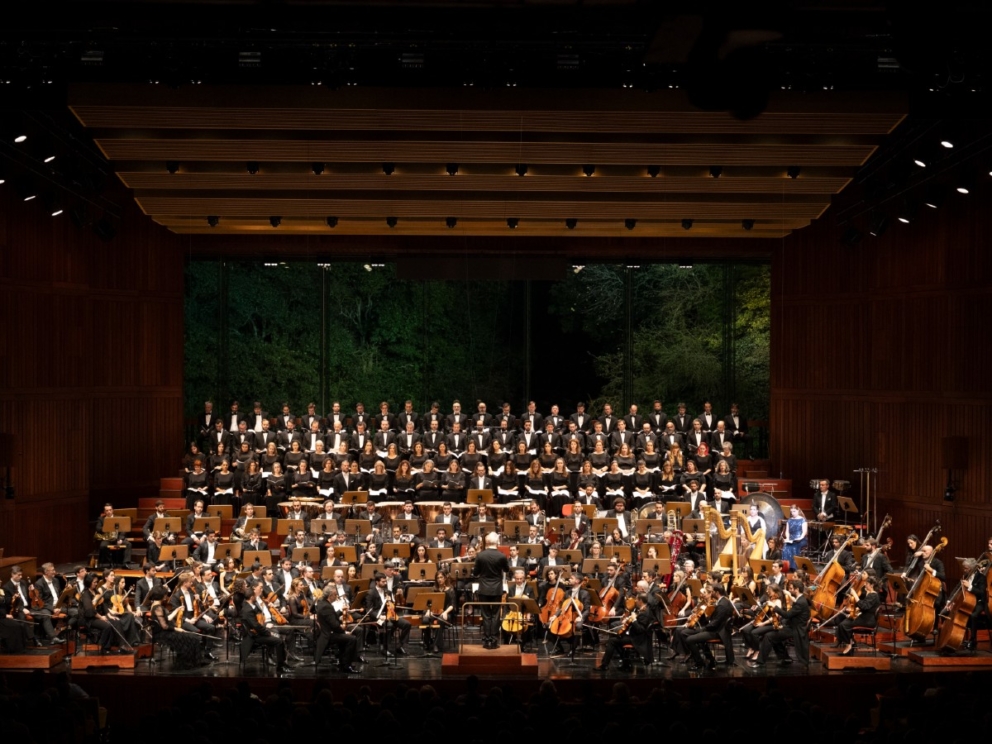
Gulbenkian Choir
Coro Gulbenkian was founded in 1964 by the Calouste Gulbenkian Foundation as a full symphonic body of around 100 singers. The choir joins the Orquestra Gulbenkian and other orchestras to perform Classical, Romantic and Contemporary choral-symphonic repertoire, but can also perform a cappella. It has performed – and often premiered – many 20th century works by Portuguese and international composers.
Coro Gulbenkian has been invited to collaborate with major international orchestras, under the direction of conductors such as Claudio Abbado, Colin Davis, John Nelson, Emmanuel Krivine, Esa-Pekka Salonen, Frans Brüggen, Franz Welser-Möst, Gerd Albrecht, Michael Gielen, Michael Tilson Thomas, Rafael Frübeck de Burgos, René Jacobs and Leonard Slatkin, among others.
Besides its regular season of concerts in Lisbon and frequent national tours, Coro Gulbenkian has repeatedly toured Argentina, Belgium, Brazil, Canada, Denmark, France, Germany, Hungary, India, Iraq, Israel, Italy, Japan, Macao, Malta, Monaco, Netherlands, Spain, the United Kingdom, the United States of America and Uruguay.
Coro Gulbenkian has recorded extensively for Philips, Deutsche Grammophon, Erato, Cascavelle, Musifrance, as well as FNAC-Music, performing a wide range of repertoire, from Early-Renaissance polyphony to Xenakis. Several of these albums received international awards.
Michel Corboz was the Principal Conductor between 1969 and 2019. Jorge Matta and Inês Tavares Lopes are currently the Associate and Assistant conductors, respectively.
-
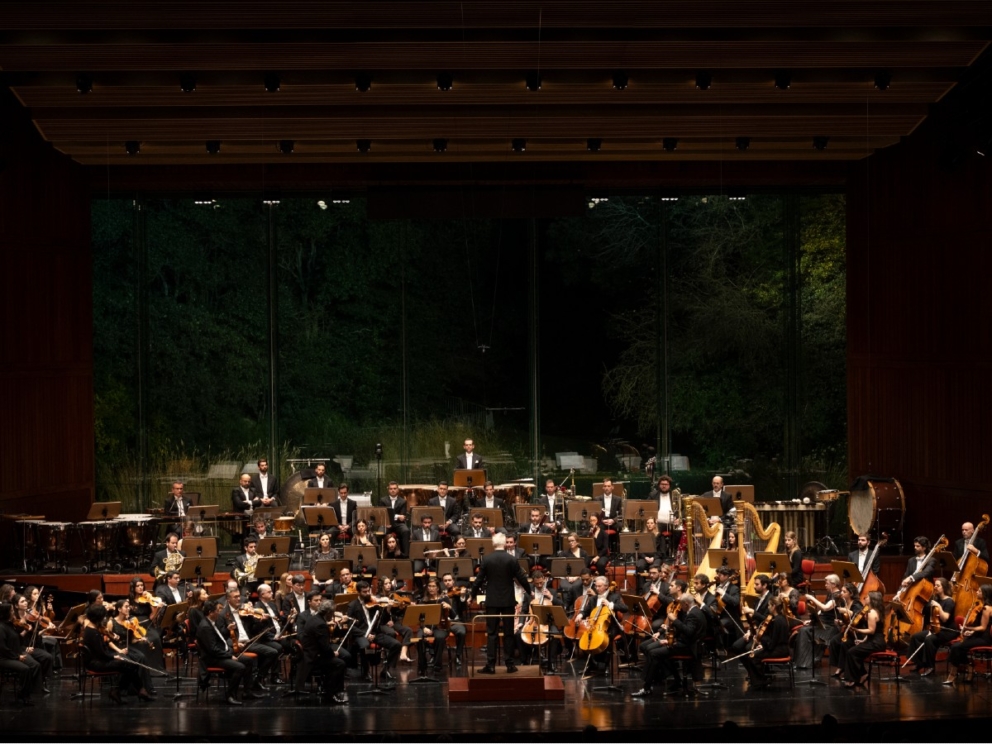
Gulbenkian Orchestra
In 1962, the Calouste Gulbenkian Foundation decided to establish a permanent orchestral ensemble. Originally with only twelve musicians (strings and continuo) it was named “Orquestra de Câmara Gulbenkian”. This collective was successively enlarged and today the “Orquestra Gulbenkian” (the name it has adopted since 1971) has a permanent body of sixty instrumentalists, a number that can be expanded depending on the repertoire.
This structure allows the Gulbenkian Orchestra to interpret works from the Baroque and Classical periods, a significant part of 19th century orchestral literature and much of the music of the 20th century, including works belonging to the current repertoire of the traditional symphonic orchestras. In each season, the orchestra performs on a regular series of concerts at the Gulbenkian Grand Auditorium in Lisbon, where it has had the opportunity of working together with some of leading names of the world of music (conductors and soloists). It has also performed on numerous locations all over Portugal, in an effort to decentralize music and culture.
The orchestra has been constantly expanding its activities in the international level, performing in Europe, Asia Africa, and the Americas. In the recording field, Orquestra Gulbenkian is associated to labels as Philips, Deutsche Grammophon, Hyperion, Teldec, Erato, Adès, Nimbus, Lyrinx, Naïve and Pentatone, among others, and this activity was recognized with several international prizes.
-
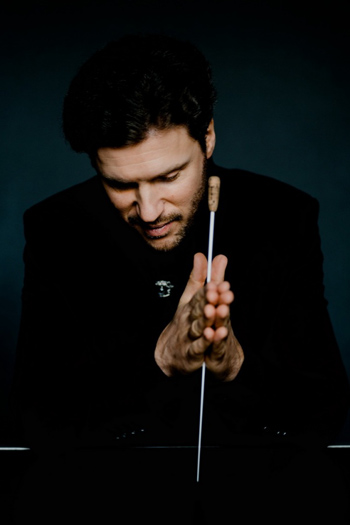
Stanislav Kochanovsky
Conductor
Appointed Chief Conductor of the NDR Radiophilharmonie in Hannover starting with the 2024/25 season, Stanislav Kochanovsky has a refined artistic personality that has led him to be considered one of the most brilliant conductors of our time.
In recent years, he has made successful debuts with, among others, the Royal Concertgebouw Orchestra, the Wiener Symphoniker, the National Symphony Orchestra of Washington and the Cleveland Orchestra, collaborating with soloists such as L. Kavakos, M. Pletnev, N. Lugansky, M. Vengerov, D. Matsuev, A. Volodin, K. Gerstein, S. Khachatryan, V. Frang, T. Mork, P. Ferrandez, M. Goerne.
In the 2023/24 season, he will continue his regular collaboration with the Accademia Nazionale di Santa Cecilia, the DR Danish National Symphony Orchestra, the Netherlands Philharmonic, the Orchestre Philharmonique de Strasbourg, the Belgian National Orchestra, the Orchestre Philharmonique de Monte-Carlo, among others, and will meet for the first time the WDR Sinfonieorchester in Köln, the Teatro La Fenice Orchestra in Venice, the KBS Symphony Orchestra and will tour with the Dresdner Philharmonie in the UK, performing in the major cities of England, Scotland and Wales.
With his profound knowledge and experience of a wide range of symphonic and operatic repertoire, he is regularly invited by renowned orchestras and opera houses around the world, such as the Orchestre de Paris, the Accademia Nazionale di Santa Cecilia, the Philharmonia Orchestra of London, the Rotterdam Philharmonic, the Netherlands Radio Philharmonic, the Oslo Philharmonic, the Danish National Symphony, the NDR Elbphilharmonie, among others. During his career, he has also collaborated with leading Russian orchestras such as the St. Petersburg Philharmonic, the Russian National Orchestra, the National Philharmonic Orchestra of Russia and the Moscow Philharmonic Orchestra.
With more than thirty operas in his repertoire, recent opera engagements have included The Pique Dame and Evgenij Onegin at the Opernhaus Zürich, Iolanta at the Maggio Musicale Fiorentino and Prince Igor at the Dutch National Opera Amsterdam, working with distinguished directors and singers such as D. Tcherniakov, B. Kosky, E. Nikitin, A. Netrebko, I. Abdrazakov, O. Borodina, L. Davidsen, P. Mattei. As a guest conductor, he performed regularly for years at the Mariinsky Theatre. Since 2017, Kochanovsky is a regular guest at the Verbier Festival where he conducted opera in concerts (Evgenij Onegin, Rigoletto, Die Zauberflöte, Hansel and Gretel) and symphonic programme with soloists Lucas Debargue and Mikhail Pletnev.
In addition to the classical repertoire, Kochanovsky has a strong interest in rarely performed works and new compositions. Over the last few seasons, he has conducted rare gems as Ligeti’s Requiem, Scriabin-Nemtin’s Prefatory Action “Mysterium”, Kodály’s Psalmus Hungaricus, Shostakovich’s unfinished opera “The Gamblers”; Myaskovsky’s “Silence”, Weinberg’s Symphony No. 21 “Kaddish”; and works by living composers such as Dean, Fedele, Broström, Tawfiq, Visman, Campogrande, Martinsson, Golijov, Thorvaldsdottir, Tarnopolski, Rääts, Vasks.
Stanislav Kochanovsky attended the Glinka Choir School in his hometown of St. Petersburg before going on to graduate with honours at the Rimsky-Korsakov Conservatoire, where he studied choral conducting, organ and opera-symphonic conducting. He was Chief Conductor of the State Safonov Philharmonic Orchestra and in 2007 began his collaboration with the Mikhailovsky Theatre where, from the age of 25, he had the great opportunity to conduct more than sixty opera and ballet performances.
-
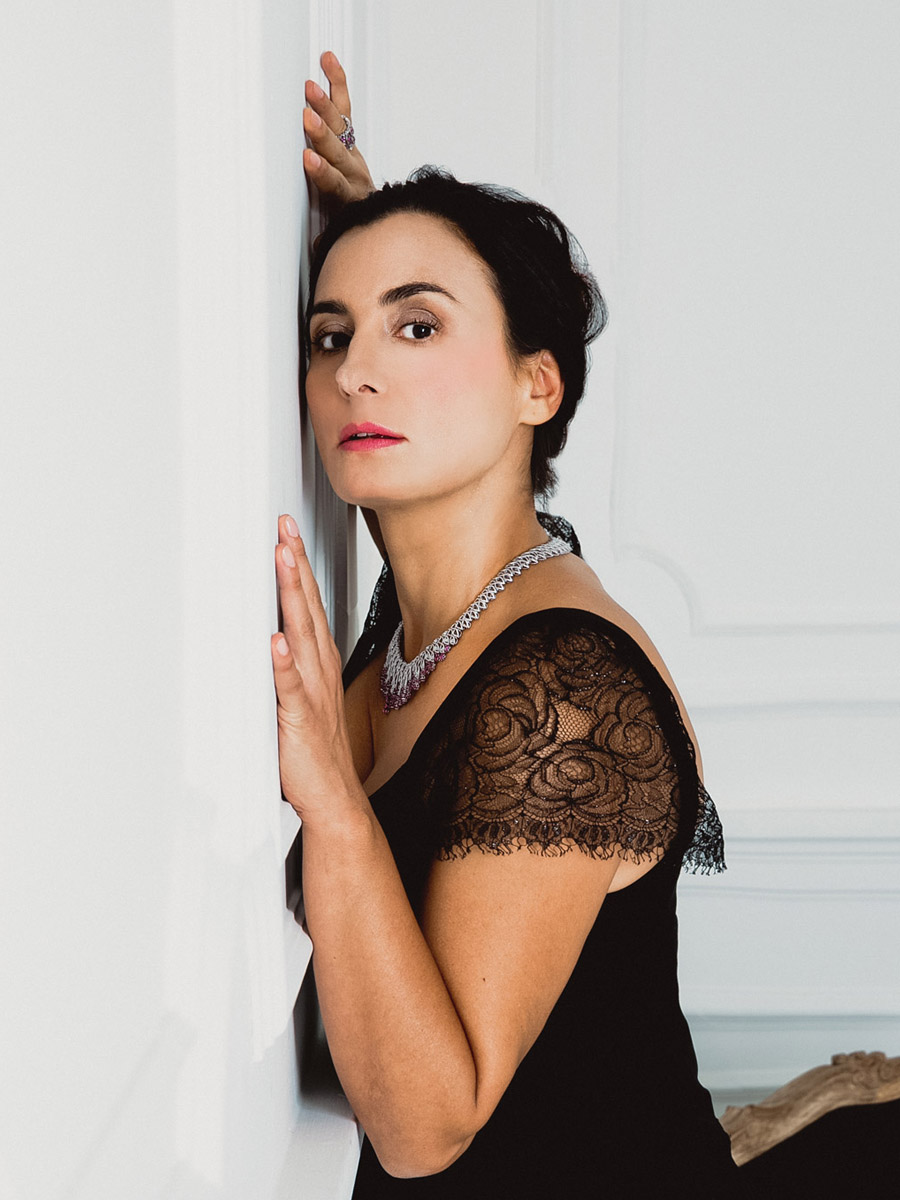
Carmela Remigio
Soprano
Awarded the prestigious “Premio Abbiati” by the Associazione Critici Musicali Italiani for her “technique, musicality and stage presence that allow her to deliver undoubtedly valuable performances, supported by a proper knowledge of the style of each score”, soprano Carmela Remigio began her violin studies at the age of five. Only a few years later she began taking voice lessons under Aldo Protti, then perfecting her technique under Leone Magiera. After winning the 1992 “Luciano Pavarotti International Voice Competition” in Philadelphia she made her debut – at the young age of nineteen – singing the lead role in Giampaolo Testoni’s opera Alice at the Teatro Massimo in Palermo.
Heir to Italy’s greatest singing tradition she has performed with Pavarotti in over seventy concerts worldwide since 1997, performing at London’s Royal Albert Hall, New York’s Carnegie Hall, and then Paris, Miami, Dublin, Beirut, Seoul, Bucharest, Hochland, to name a few.
Following her first baroque roles – that allowed her to develop her enunciation skills – she dedicated passionately to Mozart’s operas, singing all of their main roles: Susanna and Countess in Le Nozze di Figaro, Elettra and Ilia in Idomeneo, Fiordiligi in Così Fan Tutte, Vitellia in La Clemenza di Tito, Pamina in Die Zauberflöte. She has interpreted more than five hundred performances of Don Giovanni, singing both Donna Elvira and Donna Anna, the latter role allowing her to work with Peter Brook and Claudio Abbado, with whom she recorded, as a still very young artist, a prestigious version of Mozart’s masterpiece under the label Deutsche Grammophon (1998).
Since then she has collaborated with conductors such as Antonio Pappano, Myung-Whun Chung, Jeffrey Tate, Daniele Gatti, Daniel Harding, Gustavo Dudamel, Riccardo Chailly, Gianandrea Noseda, Fabio Luisi, Juraj Valčuha, John Axelrod, Roberto Abbado, Lorin Maazel, Michel Plasson, Eliahu Inbal, Michele Mariotti, Kent Nagano, Rinaldo Alessandrini; and stage directors like David McVicar, Graham Vick, Pier Luigi Pizzi, Federico Tiezzi, Karole Armitage, Mario Martone, Luca Ronconi, Damiano Michieletto, Robert Wilson and Peter Brook.
Her debuts in Verdi’s roles like Alice in Falstaff (under Claudio Abbado and Lorin Maazel at the Salzburg Festival), Desdemona in Otello, Messa da Requiem, Amelia in Simon Boccanegra, and Violetta in La Traviata, opened the doors to the romantic repertoire and to new opportunities to master her singing technique and her interpretation skills.
Her repertoire includes operas by Puccini, like La Bohème (Mimì) and Turandot (Liù); by Donizetti, of whom she interpreted Lucrezia Borgia, Il castello di Kenilworth, Belisario, and his entire “Three Tudor Queens Cycle” (Maria Stuarda, Roberto Devereux, and Anna Bolena) –; and operas by Rossini, like L’Inganno Felice, Maometto Secondo, Il Viaggio a Reims and Mosè in Egitto.
Some other roles she has interpreted are Norma, Adalgisa, Micaela (Carmen), Cleopatra (Giulio Cesare), Marguerite (Faust), Malwina (Marschner’s Der Vampyr), Alceste, Euridice (Orfeo ed Euridice), Armida in Handel’s Rinaldo, Manfroces’s Ecuba and Arianna (Arianna a Nasso), the title role in Scarlatti’s Griselda.
A passionate Bel Canto interpreter, Carmela Remigio has expanded her repertoire to include roles like that of Tatiana in Tchaikovsky’s Eugene Onegin at Teatro San Carlo in Naples, Anne Trulove in Stravinsky’s The Rake’s Progress at the Teatro Massimo di Palermo and at La Fenice in Venice with Damiano Micheletto’s staging, Miranda in Alfredo Casella’s La Donna Serpente at the Teatro Regio di Torino, Suzel (L’amico Fritz) at La Fenice and Nedda in Leoncavallo’s Pagliacci at the Teatro dell’Opera di Roma and in Bologna.
She performs both opera and chamber music – sacred and secular – in the main Italian and international theatres, music festivals and concert halls: Teatro alla Scala in Milan, Salzburg Festival, London’s Royal Opera House, Teatro San Carlo in Naples, Teatro Comunale di Bologna, Rossini Opera Festival in Pesaro, Teatro dell’Opera di Roma, Aix-en-Provence Festival, Teatro La Fenice in Venice, Teatro Regio di Torino, La Monnaie in Brussels, and then Lausanne, Tokyo, Trieste, Lugano, Florence, Los Angeles, Paris, Hamburg.
Some her most relevant recordings include two different editions of Don Giovanni (Donna Anna), one of the two under Claudio Abbado (Deutsche Grammophon) and the other under Daniel Harding (Virgin), Rossini’s Stabat Mater conducted by Gianluigi Gelmetti (Agorà), Arie Sacre Verdiane under Myung-Whun Chung (Deutsche Grammophon), a double CD titled Arias (Universal-Decca) dedicated to Tosti and Rossini. Among the DVDs we mention A Verdi gala from Berlin on the occasion of the New Year’s Concert in 2001 with the Berliner Philharmoniker conducted by Claudio Abbado; Otello conducted by Myung-Whun Chung (C Major); Il viaggio a Reims from the Teatro alla Scala under the musical direction of Ottavio Dantone; Lucrezia Borgia from the Donizetti Festival 2019 and Rinaldo in the historic production by Pier Luigi Pizzi (Dynamic).
In 2022 she was awarded the “40° Premio Piccinni”.
-
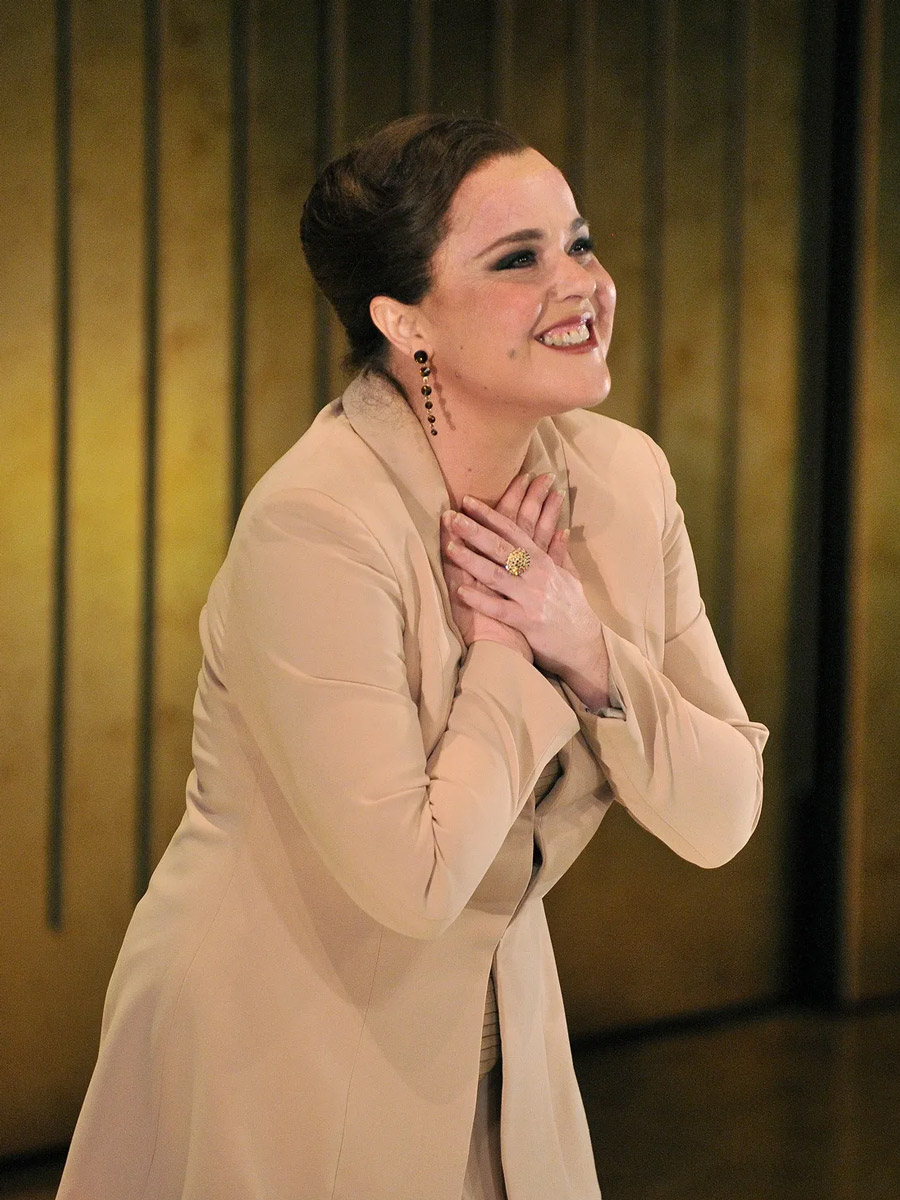
Sonia Ganassi
Mezzo-Soprano
Sonia Ganassi is considered one of the greatest Mezzos of her generation. She is regularly ,invited to perform at the world's most prestigious opera houses, including the Metropolitan Opera in New York, the Royal Opera House-Covent Garden in London, Teatro Alla Scala in Milan, Teatro Real in Madrid, Gran Teatre del Liceu in Barcelona, Bayerische Staatsoper in Munich, just to mention a few, where she collaborates with such conductors as Daniel Barenboim, Riccardo Chailly, Myung-Whun Chung, Daniele Gatti, Riccardo Muti and Antonio Pappano.
As a result of her numerous successes, in 1999 she wins the Premio Abbiati, Italy's most prestigious music critics award.
Her vast repertory – mostly recorded on CD and DVD – includes: Rosina in Il barbiere di Siviglia, Angelina in Cenerentola, Adalgisa in Norma, Leonora in La Favorita, Zaïde in Dom Sebastien, Jane Seymour in Anna Bolena, Elizabeth in Maria Stuarda, Idamante in Idomeneo, Donna Elvira in Don Giovanni, Eboli in Don Carlo, Charlotte in Werther, Marguerite in La Damnation de Faust, and the title roles in Carmen, Ermione and Elisabetta Regina d’Inghilterra.
Sonia also enjoys a prolific concert activity, performing among numerous others: Stabat Mater at the Concertegebow in Amsterdam, at Avery Fisher Hall in New York and at Teatro alla Scala in Milan, Verdi's Requiem at the Berlin Philharmonie, at La Scala under the baton of Daniel Barenboim, at Accademia ,di Santa Cecilia in Rome conducted by Antonio Pappano, at Teatro San Carlo in Naples conducted by M° Muti and in Parma conducted by M° Temirkanov.
Among her engagements: Roberto Devereux in Madrid, Munich and Genua, Don Carlo in Munich and Tokyo, Nabucco ,in Rome and Salzburg, Oedipus Rex in Paris, conducted by Daniele Gatti, and in Rome, Santa Cecilia, Aida in Marseille, Naples and Macerata, Carmen in Genua, Anna Bolena in Wien, Norma in Lyon, Paris, Seville, Berlin and Macerata, Maria Stuarda in Verona, Capuleti e Montecchi in Venice, La Straniera in Berlin, Le Cid in Paris, Pelléas et Mélisande in Florence, a new production of Norma at Covent Garden in London, Anna Bolena in Marseille, Parma and at Teatro alla Scala, Stabat Mater in Parma and Piacenza, Don Carlo in Marseille, Fra Diavolo in Rome and in Palermo, Roberto Devereux in Parma, Enrico di Borgogna in Bergamo and Werther in Venice and Reggio Emilia, La Favorite in Liège and Palermo, Cavalleria rusticana in Dresden Palermo, Genoa, Bologna, Stuttgart, Valencia and Verona, Macbeth in Cagliari, Anna Bolena in Genoa, Aida in Macerata and Madrid, Adriana Lecouvreur in Parma.
-
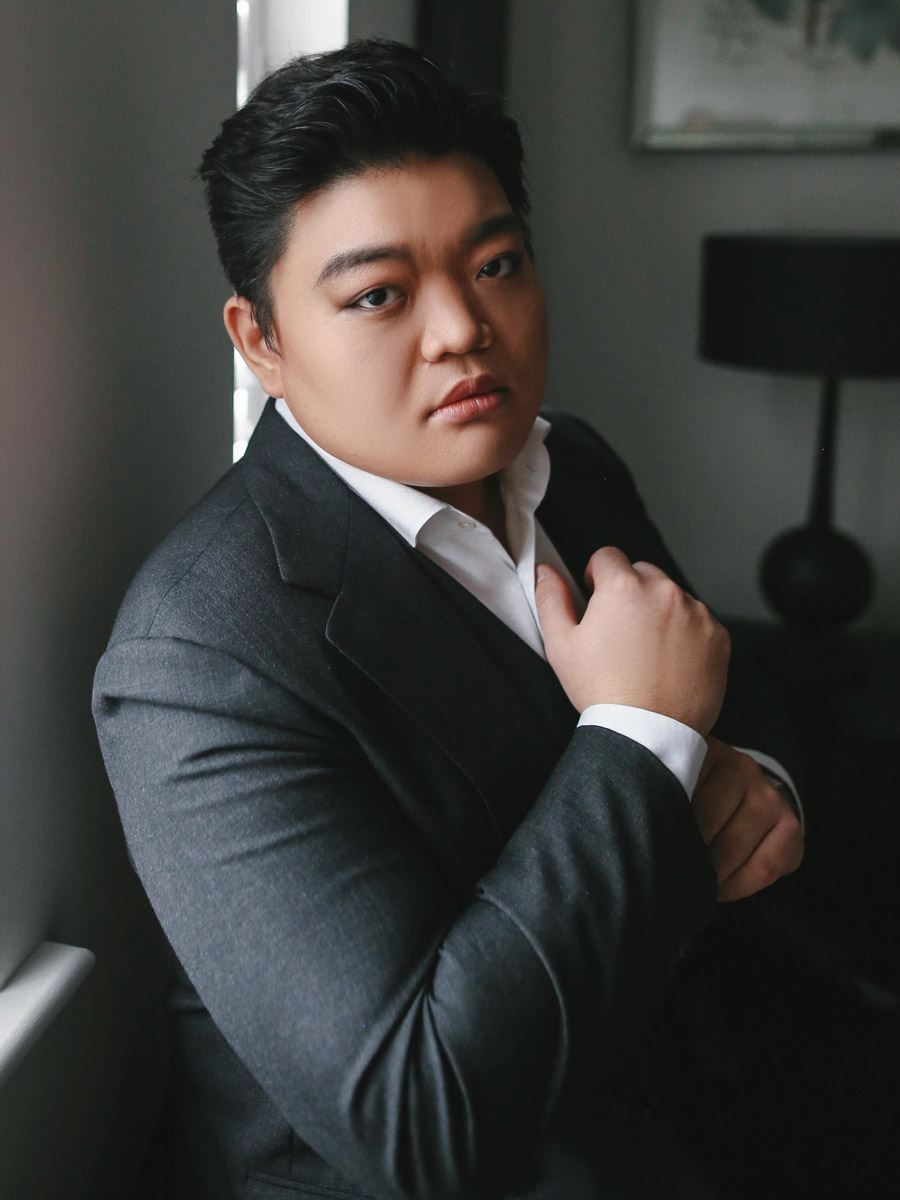
David Junghoon Kim
Tenor
An alumnus of the Jette Parker Young Artist Programme, Korean tenor David Junghoon Kim is the winner of the much-coveted Francisco Viñas, Voci Verdiane and Toulouse singing competitions. Since his graduation from the programme in 2017, Kim has made a series of notable debuts and appearances: as Alfredo in a new production of La traviata in Cologne, Macduff Macbeth at the Royal Opera House and Zürich Opera, Rodolfo La bohème in Zürich and Stuttgart; Roméo Roméo et Juliette at Grange Park Opera, and Leone de Casaldi in concert performances of the world premiere of Donizetti’s L’ange de Nisida with Sir Mark Elder at the Royal Opera House - recorded and later released by Opera Rara.
In the 2023/24 season, Junghoon Kim makes debuts at the Welsh National Opera as Alfredo La Traviata; Volksoper Wien as Rodolfo La bohème; Opera Nice Côte d'Azur as the Prince Rusalka and returns to Staatsoper Stuttgart for his role debut as Don Carlos. On the concert platform, he joins Omroep Muziek under the baton of Karina Canellakis as the title role in La Damnation de Faust.
Recent engagements include Rodolfo La bohème at the Royal Opera House and for his company debut at Glyndebourne and for English National Opera’s “Drive & Live” series at the Alexandra Palace, and Cavaradossi Tosca as part of the South Facing Festival; Verdi Requiem debut at the BBC Proms with the BBC Philharmonic; Macduff Macbeth at the Royal Opera House and his role debut as The Prince Rusalka with Alan Gilbert at the NDR Elbphilharmonie Orchestra in Hamburg and also at Stuttgart Opera in a new production.
Other recent engagements include Macduff Macbeth and Rodolfo La bohème at Opernhaus Zürich; Rodolfo La bohème at Oper Stuttgart; Italian Singer Der Rosenkavalier at Teatro Municipal de Santiago de Chile and Royal Opera House; Edgardo Lucia di Lammermoor at Dorset Opera Festival and Duca Rigoletto at Welsh National Opera.
A graduate of the Seoul National University, he made his professional debut as Rodolfo La bohème, subsequently joining the Jette Parker Young Artists Programme from 2015-17. As a member of the JPYAP, his roles included Italian Singer Der Rosenkavalier, Venditore Il tabarro, Arturo Lucia di Lammermoor (also covering Edgardo), Ruiz Il trovatore, Flavio Norma, Nathanael Les contes d’Hoffmann, Lamplighter Manon Lescaut, Gastone La traviata, Augustin Moser Die Meistersinger von Nürnberg, Count Lerma and Herald Don Carlo and Pong Turandot.
-
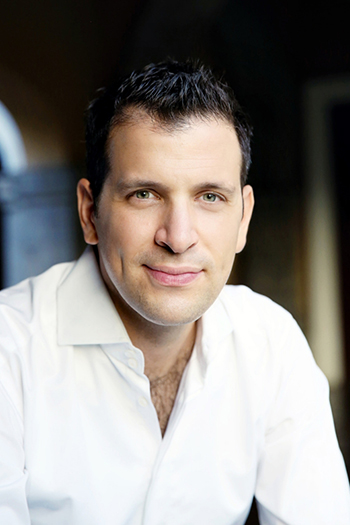
Luca Pisaroni
Bass-Baritone
Italian bass-baritone Luca Pisaroni has established himself as one of the most charismatic and versatile singers performing today. Since his debut at age 26 with the Vienna Philharmonic at the Salzburg Festival, led by Nikolaus Harnoncourt, Mr. Pisaroni has continued to bring his compelling artistry to the world’s leading opera houses, concert halls, and festivals.
In the 2023-24 season, Mr. Pisaroni makes his house and role debut with Los Angeles Opera as Don Basilio in Il barbiere di Siviglia. He will return to Opéra National de Paris to sing Achilla in Guilio Cesare. Mr. Pisaroni will sing the title role in Don Giovanni with Houston Grand Opera conducted by Dame Jane Glover. In concert, Mr. Pisaroni will sing with the Rotterdam Philharmonic Orchestra in Beethoven’s Ninth Symphony conducted by Andrew Manze and Stravinsky’s Pulcincella with San Francisco Symphony conducted by Michael Tilson Thomas.
In the 2022-2023 season, Mr. Pisaroni returned to the Canadian Opera Company to sing the title role in Le nozze di Figaro, traveled to Japan for a house debut at the Hyogo Performing Arts Center as Leporello in Don Giovanni. Mr. Pisaroni returned to Seattle Opera to sing Dulcamara in L’elisir d’amore and Opéra national de Paris to sing Alidoro in La Cenerentola.
Mr. Pisaroni’s diverse opera repertoire includes Golaud in Pelleas et Melisande at Opéra National de Paris; Mahomet II in Le Siège de Corinthe at the Rossini Opera Festival in Pesaro; Méphistophélès in Faust at Houston Grand Opera; Enrico VIII in Anna Bolena at Opernhaus Zürich; Conte Rodolfo in La Sonnambula and Mustafà in L’italiana in Algeri at Wiener Staatsoper; Giorgio in I Puritani and Caliban in The Enchanted Island at the Met; Pizarro in Fidelio at Teatro alla Scala; Le nozze di Figaro at Opéra National de Paris, San Francisco Opera, and the Bayerische Staatsoper; Leporello in Don Giovanni at Teatro alla Scala, the Metropolitan Opera, Salzburg Festival, and Tanglewood with the Boston Symphony Orchestra; Guglielmo in Così fan tutte at Glyndebourne and the Salzburg Festival; Conte Dorval in Martin y Soler’s Il Burbero di Buon Cuore at Teatro Real; Maometto in Rossini’s Maometto II at the Canadian Opera Company; and Tiridate in Handel’s Radamisto at Santa Fe Opera.
In concert, Mr. Pisaroni has performed Beethoven’s Symphony No. 9 and Schönberg’s A Survivor from Warsaw at the Laeiszhalle in Hamburg; Rossini’s Petite Messe Solennelle at the Royal Festival Hall in London; Beethoven’s Symphony No. 9 at the Gewandhaus and at the Konzerthaus Dortmund with Andris Nelsons; Frère Laurent in Berlioz’ Roméo et Juliette with Michael Tilson-Thomas and the San Francisco Symphony, Verdi’s Messa da Requiem with the Collegium Vocale Gent and Philippe Herreweghe, Haydn’s Die Jahreszeiten under the direction of Nikolaus Harnoncourt; Rossini’s Stabat Mater with Franz Welser-Möst; Schumann’s Das Paradies und die Peri with Sir Simon Rattle and the Philadelphia Orchestra; Schumann’s Faustszenen with Daniel Harding and the Berlin Philharmonic, and Beethoven’s Missa Solemnis with the LSO and Michael Tilson-Thomas.
Mr. Pisaroni has recorded for all major labels. His discography includes Don Giovanni and Rinaldo from the Glyndebourne Festival; Le nozze di Figaro with Opéra National de Paris; Così fan tutte, Don Giovanni, and Le nozze di Figaro at the Salzburg Festival; Verdi’s Simon Boccanegra with the Wiener Symphoniker, and recordings of Don Giovanni and Le nozze di Figaro with the Mahler Chamber Orchestra and Yannick Nézet-Séguin. Recent releases include Berlioz’ Roméo et Juliette with the San Francisco Symphony; Beethoven’s Mass in C Major with Mariss Jansons and the Symphonieorchester des Bayerischen Rundfunks, and Rossini’s Petite Messe Solennelle with the Orchestre Philharmonique du Luxembourg and Gustavo Gimeno.
In 2019, Luca Pisaroni was honored as one of five recipients of the Opera News Award at a ceremony hosted in New York City.
Giuseppe Verdi
Messa da Requiem
* Due to health reasons, Davide Giusti is replaced by David Junghoon Kim.
Stanislav Kochanovsky tornou-se, nos últimos anos, um dos mais elogiados e procurados jovens maestros em ascensão. Reconhecido pela grande versatilidade e firme visão tanto do repertório operático como do sinfónico, o maestro russo dirige o Coro e a Orquestra Gulbenkian num concerto final de temporada de elevada expetativa, assente na interpretação do Requiem de Verdi. A tocante obra que o compositor italiano escreveu em memória do poeta e romancista Alessandro Manzoni, considerado o pai da língua italiana moderna.
Sponsor Gulbenkian Music
The Calouste Gulbenkian Foundation reserves the right to collect and keep records of images, sounds and voice for the diffusion and preservation of the memory of its cultural and artistic activity. For further information, please contact us through the Information Request form.
